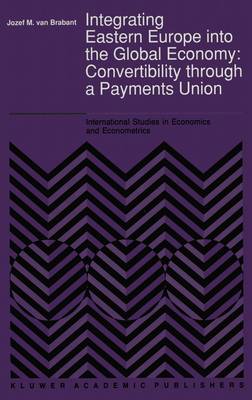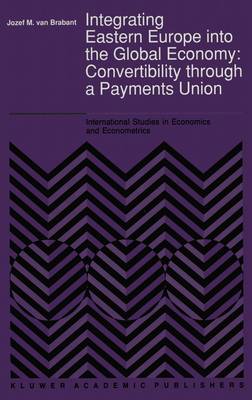
- Afhalen na 1 uur in een winkel met voorraad
- Gratis thuislevering in België vanaf € 30
- Ruim aanbod met 7 miljoen producten
- Afhalen na 1 uur in een winkel met voorraad
- Gratis thuislevering in België vanaf € 30
- Ruim aanbod met 7 miljoen producten
Zoeken
Integrating Eastern Europe Into the Global Economy:
Convertibility Through a Payments Union
Jozef M Van Brabant, J M Van Brabant
€ 183,45
+ 366 punten
Omschrijving
1. Backdrop to the payments constraint.- 2. Consensual transition policies.- 3. Regional cooperation and economic reform.- 4. Backdrop to the proposal to create a payments union.- 5. Toward convertibility through a payments union.- 6. Organization.- 1. The prevailing socioeconomic situation.- 1. Problems of changing Eastern European societies.- 2. The current socioeconomic situation in Eastern Europe.- 3. The drift of the reform debate.- 4. The nature of the payments problem.- 5. Shocks of mutating trade and payment regimes.- 6. Western assistance to combat liquidity shortage.- 2. The collapse and dissolution of the CMEA.- 1. The CMEA's demise.- 2. CMEA reform discussions.- 3. Salient obstacles to buoyant intragroup interactions.- 4. Reforming the trade and payment regimes.- 5. Balance-of-payments constraints and a payments union.- 3. Economic union in Eastern Europe.- 1. The outlook for economic union at this juncture.- 2. The desirability of economic union.- 3. Theoretical merits of a customs union.- 4. Practical problems and economic union.- 5. Linking a payments facility with an economic union.- 6. Key features of a payments union.- 4. Paths to convertibility.- 1. The global economy at Bretton Woods.- 2. On currency convertibility.- 3. Possible roads to convertibility.- 4. Western Europe's return to convertibility.- 5. Marketization, transition, and convertibility.- 1. The national trade and payment regimes.- 2. The CMEA trade and payment regimes.- 3. Marketization and convertibility.- 4. Exchange rates.- 6. Toward a payments union for Eastern Europe?.- 5. Technical aspects of a payments union.- 1. Overall conceptualization of the CEPU.- 2. Payments problems and a regional payments unions.- 3. Technical issues of a payments union.- 1. The clearing agent.- 2. Techniques of accounting.- 3. Prior imbalances and loans.- 4. Publicity.- 5. The question of asymmetry.- 6. Quotas and access to credits.- 7. Adjustment rules.- 8. Macroeconomic surveillance.- 9. Interest-rate policies.- 10. Capital cost.- 11. Duration.- 4. A hypothetical capital fund.- 5. A payments union with the Soviet Union?.- 6. Macroeconomic surveillance and the transition.- 1. Macroeconomic responses in a payments union.- 2. Adjustment under traditional and modified planning.- 1. Adjustment in the traditional CPE.- 2. Adjustment in an MPE.- 3. Standard adjustment policies and the PETs.- 4. Fund-type adjustment programs and the PETs.- 5. CEPU adjustment, commercial policy, and diplomacy.- 6. Other issues of managing a payments union.- 7. Downside risks of a CEPU.- 1. Backdrop to the debate.- 2. The rump order of priority.- 3. General arguments against payments unions.- 1. Key aspects of a payments union.- 2. The starting conditions of potential participants.- 3. Directions of desirable progress.- 4. Comments on the CEPU and their merits.- 5. An evalution of the criticisms.- 1. Emotional and political objections.- 2. Immediate full convertibility and global integration.- 3. A CEPU is too small and a CEEU wrong.- 4. Inappropriateness of present trade patterns.- 5. Too expensive, undesired, and too slow.- 8. Enlarging the European economic space.- 1. The basic preoccupations of European integration.- 2. What needs to be bridged?.- 3. On the transition to ME status.- 1. Creating markets with genuine prices.- 2. Fostering competition.- 3. Privatization and capital markets.- 4. Trade and foreign-exchange reforms.- 5. Banking infrastructure and capital markets.- 6. Macroeconomic policy.- 7. Labor market.- 8. The social safety net.- 9. Institutions of the market.- 4. On the sequencing of reforms.- 5. Economic transition and east-west assistance.- Conclusions.
Specificaties
Betrokkenen
- Auteur(s):
- Uitgeverij:
Inhoud
- Aantal bladzijden:
- 284
- Taal:
- Engels
- Reeks:
- Reeksnummer:
- nr. 25
Eigenschappen
- Productcode (EAN):
- 9780792313526
- Verschijningsdatum:
- 31/07/1991
- Uitvoering:
- Hardcover
- Formaat:
- Genaaid
- Afmetingen:
- 156 mm x 234 mm
- Gewicht:
- 576 g

Alleen bij Standaard Boekhandel
+ 366 punten op je klantenkaart van Standaard Boekhandel
Beoordelingen
We publiceren alleen reviews die voldoen aan de voorwaarden voor reviews. Bekijk onze voorwaarden voor reviews.











